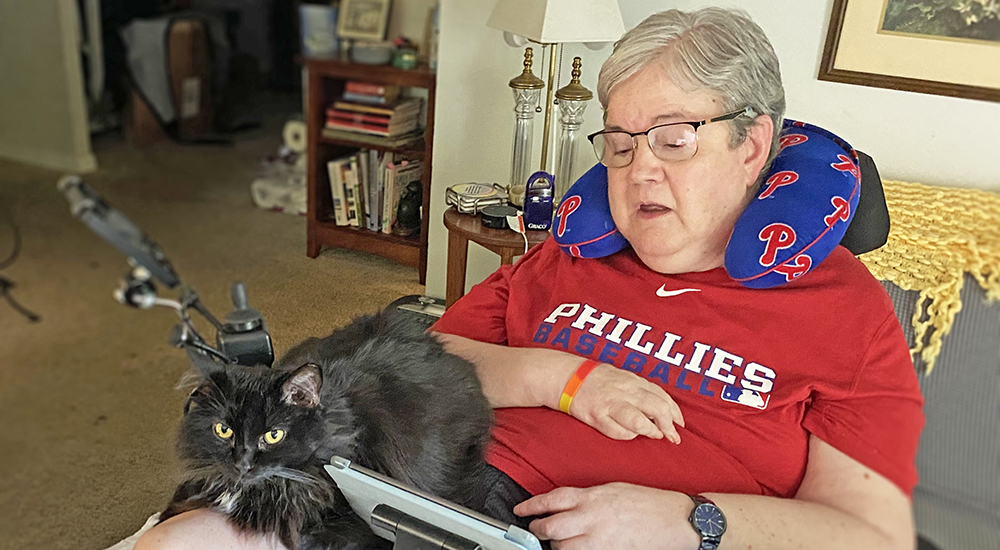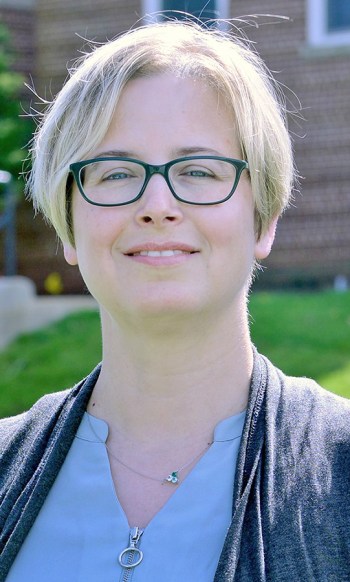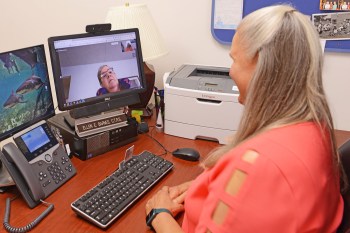Housebound Veterans from the Coatesville VA are learning everyone can be a winner when they combine virtual and in-person health care visits.
Susan Gallagher is a Navy Veteran who served from 1977 until 1983 in Virginia and Pennsylvania. She has been receiving hybrid care, both virtual and in-person, since coming to Coatesville VA through Home Based Primary Care (HBPC) more than five years ago.
While working at the Wilmington VA, Gallagher was diagnosed with Multiple Sclerosis (MS) in 1990. MS is a potentially disabling disease of the brain and central nervous system for which there is no cure. Some people, like Gallagher, develop paralysis. She continued working until 2004 and medically retired in 2005.
Hybrid Home Based Primary Care
The HBPC team at the Coatesville VA delivers in-home care to Veterans who are unable to travel to VA health care facilities because of complex medical conditions or mobility restrictions.
Gallagher does not have the ability to move independently and uses transportation services anytime she needs to travel. Nearly all of her medical appointments with VA are conducted virtually except for the in-home visits scheduled every three weeks to deliver medications, record her vital signs and see how she is doing.
“I haven’t been out to the medical center in Coatesville in the last five years except to receive my COVID vaccines and boosters,” said Gallagher. “Virtual appointments achieve the same result with much less inconvenience. It’s a win-win situation.”
The virtual appointments she attends each month may include primary care, physical therapy, mental health, nutrition, recreation therapy and any other needs that may arise. Virtual appointments save Gallagher the time and hassle of arranging a driver and vehicle to transport her, and a medical aide to attend an in-person appointment at the Coatesville campus.
“Every time I go out, it’s an hour and a half there, then the appointment and then an hour and a half back. That just blows my whole day,” she said. “But if I do it virtually, it’s an hour.”
Unable to work the iPad herself, Gallagher relies on her state-provided caregivers to set it up and navigate to the link in her email to start each appointment.
Helping Veterans figure out virtual care
Under the guidance of Dr. Christy Rothermel, a VA geriatric scholar and psychologist, the HBPC team has worked hard since before the start of the COVID-19 pandemic to identify and remove the barriers for Veterans who agree to use virtual care like VA Video Connect.
“The largest barrier was Veterans who were unable to use the device,” explained Rothermel. Common barriers include tremors and involuntary muscle movements, or a cognitive disorder where they are unable to learn new information, like how to connect to their virtual appointments.
HBPC connects Veterans to care by providing iPads, listening devices and adaptive visual technology if they need it. Veterans like Gallagher need a caregiver to assist them.
Finding the right balance with the hybrid care model
Her most enjoyable appointments are the group sessions with Gallagher’s recreation therapist, Ellen Barnes, who hosts virtual recreation therapy for housebound Veterans.
“Ellen usually has a whole agenda prepared. A lot of trivia games that I really like. But it’s more than just games. You get to know all the other guys. You know their pets and their family.” Gallagher adds that Barnes is really good at drawing people out and getting them to connect with each other.
“I couldn’t be any more appreciative.”
Today, 71% of Veterans enrolled with HBPC at Coatesville VA have the ability to use virtual appointments and are choosing between virtual and in-home care.
To say Gallagher is happy with the virtual and in-home care she receives through HBPC is an understatement. “It really has been exceptional for me. I mean everything that could possibly be done to make my life easier has been done. I couldn’t be any more appreciative.”
If you know a Veteran who might benefit from Home Based Primary Care through VA, encourage them to talk to their Primary Care Team.
Topics in this story
More Stories
Veteran Byron Potier weighed almost 300 pounds and was tired and lethargic. He was the perfect candidate for gastric sleeve surgery.
How much do you know about VA care, benefits and services? Don’t miss out on what you've earned—check out the "2025 VA Federal Benefits Guide for Veterans, Dependents, Survivors, and Caregivers" handbook to learn more.
Feeling stressed? Your breath can help you relax and focus. Take 3 minutes to reset and prioritize your well being for this week's #LiveWholeHealth practice.









In what states is this available
My husband was a Navy Veteran who passed 11-17-17 from Agent Orange. We were approved by his primary care physician to recieved health care at home or even to help me provide that care. We never received any help. It was very difficult for him & I but we got thru it with God’s help. I pray whoever needs help with their ill veteran that they receive health care assistance.
i am the widow of a navy who died… am i entitled to in home care???